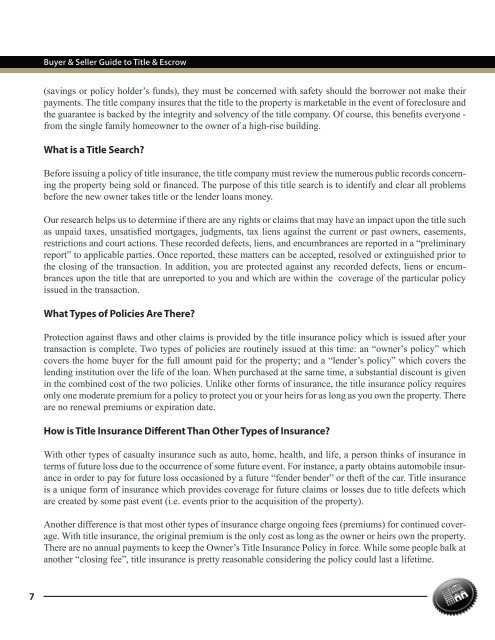Buyer & Seller Guide - Fidelity National Title
Buyer & Seller Guide - Fidelity National Title
Buyer & Seller Guide - Fidelity National Title
You also want an ePaper? Increase the reach of your titles
YUMPU automatically turns print PDFs into web optimized ePapers that Google loves.
7<br />
<strong>Buyer</strong> & <strong>Seller</strong> <strong>Guide</strong> to <strong>Title</strong> & Escrow<br />
(savings or policy holder’s funds), they must be concerned with safety should the borrower not make their<br />
payments. The title company insures that the title to the property is marketable in the event of foreclosure and<br />
the guarantee is backed by the integrity and solvency of the title company. Of course, this benefits everyone -<br />
from the single family homeowner to the owner of a high-rise building.<br />
What is a <strong>Title</strong> Search?<br />
Before issuing a policy of title insurance, the title company must review the numerous public records concerning<br />
the property being sold or financed. The purpose of this title search is to identify and clear all problems<br />
before the new owner takes title or the lender loans money.<br />
Our research helps us to determine if there are any rights or claims that may have an impact upon the title such<br />
as unpaid taxes, unsatisfied mortgages, judgments, tax liens against the current or past owners, easements,<br />
restrictions and court actions. These recorded defects, liens, and encumbrances are reported in a “preliminary<br />
report” to applicable parties. Once reported, these matters can be accepted, resolved or extinguished prior to<br />
the closing of the transaction. In addition, you are protected against any recorded defects, liens or encumbrances<br />
upon the title that are unreported to you and which are within the coverage of the particular policy<br />
issued in the transaction.<br />
What Types of Policies Are There?<br />
Protection against flaws and other claims is provided by the title insurance policy which is issued after your<br />
transaction is complete. Two types of policies are routinely issued at this time: an “owner’s policy” which<br />
covers the home buyer for the full amount paid for the property; and a “lender’s policy” which covers the<br />
lending institution over the life of the loan. When purchased at the same time, a substantial discount is given<br />
in the combined cost of the two policies. Unlike other forms of insurance, the title insurance policy requires<br />
only one moderate premium for a policy to protect you or your heirs for as long as you own the property. There<br />
are no renewal premiums or expiration date.<br />
How is <strong>Title</strong> Insurance Different Than Other Types of Insurance?<br />
With other types of casualty insurance such as auto, home, health, and life, a person thinks of insurance in<br />
terms of future loss due to the occurrence of some future event. For instance, a party obtains automobile insurance<br />
in order to pay for future loss occasioned by a future “fender bender” or theft of the car. <strong>Title</strong> insurance<br />
is a unique form of insurance which provides coverage for future claims or losses due to title defects which<br />
are created by some past event (i.e. events prior to the acquisition of the property).<br />
Another difference is that most other types of insurance charge ongoing fees (premiums) for continued coverage.<br />
With title insurance, the original premium is the only cost as long as the owner or heirs own the property.<br />
There are no annual payments to keep the Owner’s <strong>Title</strong> Insurance Policy in force. While some people balk at<br />
another “closing fee”, title insurance is pretty reasonable considering the policy could last a lifetime.


